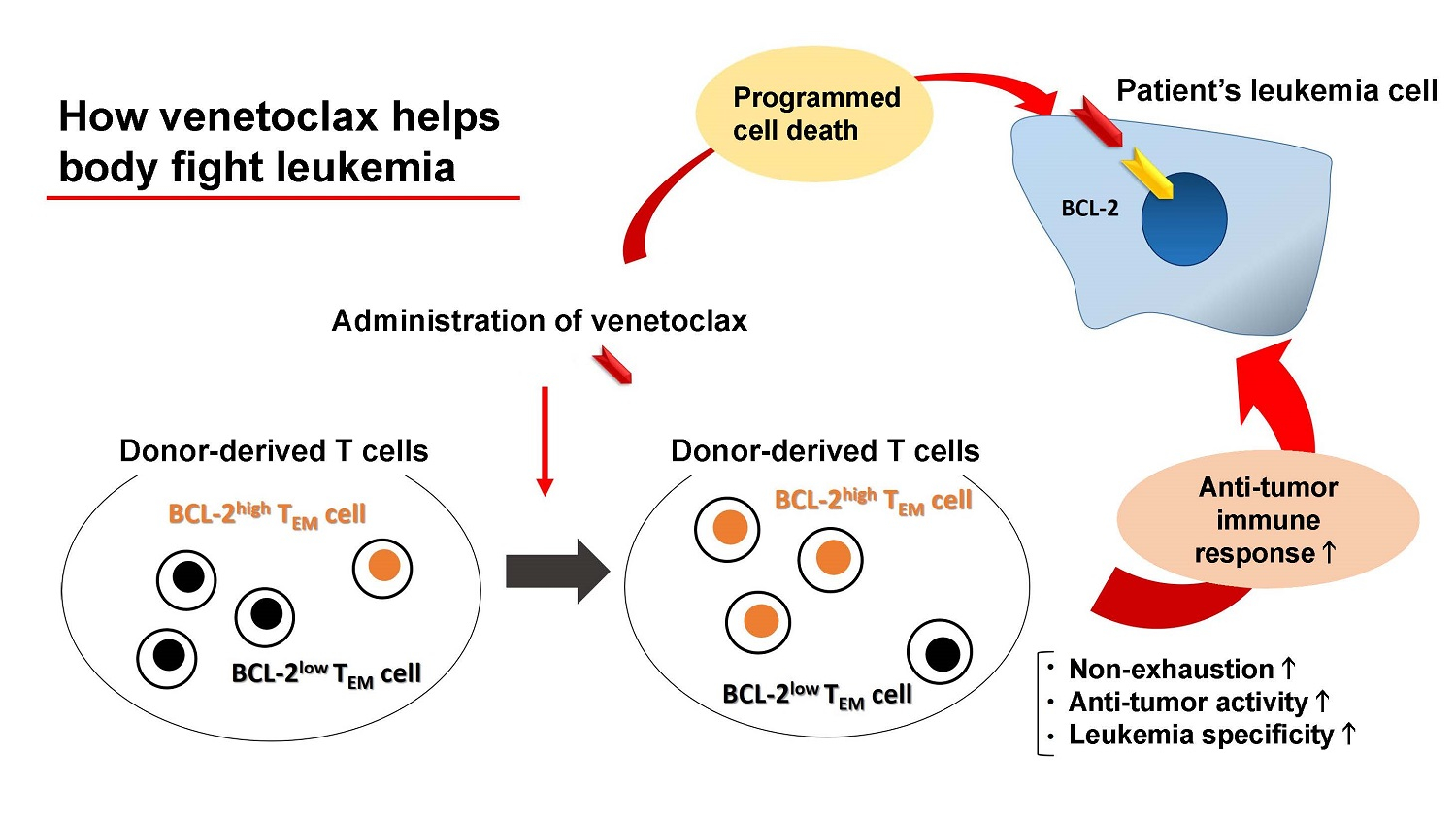Research News
Jul 18, 2024
- Medicine
Novel drug application shows improved survival for patients with relapsed and refractory acute myeloid leukemia
Combination of venetoclax and azacitidine helps patients with AML who relapse after hematopoietic cell transplant

How venetoclax helps body fight leukemia
Effect of the oral medication venetoclax after allogeneic hematopoietic cell transplantation.
Credit: Osaka Metropolitan University
Relapsed/refractory acute myeloid leukemia (AML), a so-called blood cancer, has an extremely poor prognosis because of resistance to anti-cancer drugs and frailty of the patient’s organ functions. A type of anti-tumor immunotherapy called allogeneic hematopoietic cell transplantation, which can exert anti-cancer effect accompanied by severe toxicity, is often performed for patients who are hard to treat with chemotherapy, but relapse still remains
The hematopoietic cell transplant team in Osaka Metropolitan University Graduate School of Medicine has developed a novel strategy using a new drug combination, which demonstrated significant anti-cancer effect with mild toxicity for relapsed/refractory AML patients. In addition, the detailed immunological study showed how a new drug induced the enhancement of anti-cancer activity via alterations of immune cells.
In correspondence published in the Nature-affiliated Blood Cancer Journal, the researchers report on their clinical observational study using venetoclax in combination with azacitidine as the treatment for 12 patients with AML who relapsed after allogeneic hematopoietic cell transplantation.
Venetoclax is an oral medication developed by AbbVie and Roche that was approved by the U.S. Food and Drug Administration in October 2020 for AML. It has shown promising results for older patients with untreated AML in promoting the death of cancer cells by inhibiting a regulator protein known as BCL-2.
The OMU researchers’ study showed markedly better survival rates after one year for the venetoclax combination therapy group than a control group of 61 patients, at 66.7% to 27.3%. They also showed in the immunological study that the alterations of immune cells induced by venetoclax had enhanced the anti-tumor activity.
“This study demonstrates that novel therapy can improve the prognosis of relapsed/refractory acute myeloid leukemia through both clinical and basic approaches. This therapy can be applied to more patients because of the reduction of the treatment burden,” proclaimed Dr. Mitsutaka Nishimoto, the corresponding author. “We hope this will lead to the development of safer, more effective treatments.”
Paper Information
Journal: Blood Cancer Journal
Title: T cells with high BCL-2 expression induced by venetoclax impact anti-leukemic immunity “graft-versus-leukemia effects”
DOI: 10.1038/s41408-024-01064-0
Author: Joji Nagasaki, Mitsutaka Nishimoto, Hideo Koh, Hiroshi Okamura, Mika Nakamae, Kazuki Sakatoku, Kentaro Ido, Masatomo Kuno, Yosuke Makuuchi, Teruhito Takakuwa, Yasuhiro Nakashima, Masayuki Hino, Hirohisa Nakamae
Published: 14 May 2024
https://doi.org/10.1038/s41408-024-01064-0
Contact
Graduate School of Medicine
Email: nishimo[at]omu.ac.jp
*Please change [at] to @.
SDGs
